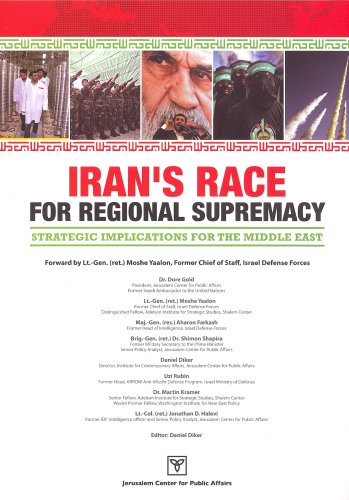Iran' s Race for Regional Supremacy: Strategic Implications for the Middle East - Softcover

The Iranian regime has accelerated its quest for regional supremacy through its nuclear weapons program and its mobilization of Shiite and Sunni terror surrogates from Lebanon to Iraq to Afghanistan. Unfortunately, Iran's advancing regional control on the ground has not been fully appreciated by the international community, and has even been downplayed in certain quarters. As a result, the U.S.-led Western Alliance has not forced Tehran to pay a price for its acts of aggression over the past several years while the West's skittishness has emboldened the regime across the Middle East. At the same time, the Europeans have pressed Washington for further diplomatic progress in the Arab-Israeli peace process. The net effect of the Western Alliance's dual-track diplomacy has been to push Israel to place its defensive requirements on the negotiating table opposite the Palestinians without adequately addressing Iran's offensive capabilities throughout the region in general and in the Palestinian areas in particular. Yet, while President Bush dispatched his secretary of state, Condoleezza Rice, to advance Israeli-Palestinian negotiations, he frankly admitted to The Guardian on June 15, 2008: "Yes, there's concern about the Palestinian state, but the dialogue has shifted dramatically from, 'solve the Palestinian state and you've solved the problems in the Middle East to, now, 'solve the Iranian issue and you solve the problems in the Middle East'." The Jerusalem Center's latest policy monograph suggests that the Arab-Israeli conflict and the ongoing attempts to resolve it must be considered as part of a broader assessment of the Iranian regime's stated policy and current capabilities to destroy Israel and subvert Arab governments across the Middle East.
"synopsis" may belong to another edition of this title.
About the Author:
Dr. Dore Gold, President of the Jerusalem Center for Public Affairs, served as Israel s Ambassador to the United Nations (1997-1999). Previously he served as foreign policy advisor to former Prime Minister Benjamin Netanyahu, was an envoy to Jordan, Egypt, the Palestinian Authority, and the Gulf States and served as an advisor to the Israeli delegation to the Madrid Peace Conference. Dr. Gold is the author of Hatred s Kingdom: How Saudi Arabia Supports the New Global Terrorism (Regnery, 2003); Tower of Babble: How the United Nations Has Fueled Global Chaos (Crown Forum, 2004); and The Fight for Jerusalem: Radical Islam, the West, and the Future of the Holy City (Regnery, 2007). Lt. Gen. (Ret.) Moshe Yaalon is the former Chief of General Staff, IDF from 2002 to 2005, during which time he led the army's successful effort to quell the Palestinian terror war launched in September 2000. He is currently a distinguished fellow at the Shalem Center. Maj.-Gen. (res.) Aharon Zeevi Farkash served in a variety of roles both in the field and on the general staff, commanding such units as the Technological and Logistics Branch, the Planning Branch and the Intelligence Branch. He serves as Head of the Intelligence and National Defense Program of the Institute for National Security Studies (INNS) at Tel Aviv University. Brig. Gen. (ret.) Dr. Shimon Shapira served as military secretary to Prime Minister Benjamin Netanyahu. He is a senior research associate at the Jerusalem Center for Public Affairs. Daniel Diker, is Director of the Institute for Contemporary Affairs and foreign policy analyst at the Jerusalem Center for Public Affairs, Uzi Rubin has been involved in Israeli military research, development, and engineering programs for almost forty years. Between 1991 and 1999 he served as head of Israel s Missile Defense Organization, and in that capacity he oversaw the development of Israel s Arrow anti-missile defense system. He was awarded the Israel Defense Prize in 1996 and 2003. Dr. Martin Kramer, an authority on contemporary Islam and Arab politicsm, is a senior fellow at the Shalem Center and author of the best-selling monograph, Ivory Towers on Sand: The Failure of Middle Eastern Studies in America. Lt. Col. (res.) Jonathan D. Halevi is a senior researcher of the Middle East and radical Islam at the Jerusalem Center for Public Affairs. He is a founder of the Orient Research Group Ltd. and is a former advisor to the Policy Planning Division of the Ministry of Foreign Affairs and IDF Intelligence officer.
"About this title" may belong to another edition of this title.
- PublisherJerusalem Center for Public Affairs
- Publication date2008
- ISBN 10 9652180645
- ISBN 13 9789652180643
- BindingPaperback
- Number of pages84
US$ 5.99
Shipping:
US$ 3.75
Within U.S.A.
Top Search Results from the AbeBooks Marketplace
Iran' s Race for Regional Supremacy: Strategic Implications for the Middle East
Published by
Jerusalem Center for Public Affa
(2008)
ISBN 10: 9652180645
ISBN 13: 9789652180643
Used
Paperback
Quantity: 1
Seller:
Rating
Book Description Paperback. Condition: Good. Connecting readers with great books since 1972! Used books may not include companion materials, and may have some shelf wear or limited writing. We ship orders daily and Customer Service is our top priority!. Seller Inventory # S_320463112
Buy Used
US$ 5.99
Convert currency

